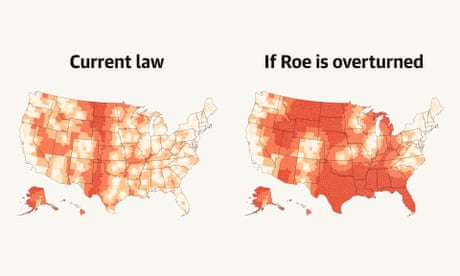- by foxnews
- 23 May 2025
Abortion deserts: America’s new geography of access to care - mapped
Abortion deserts: America’s new geography of access to care - mapped
- by theguardian
- 06 May 2022
- in news

A leaked draft of a supreme court opinion shows that the country's highest court is on the verge of overturning the 1973 landmark decision Roe v Wade, which guarantees a federal right to abortion.
In its absence, states hostile to abortion would be free to ban or severely restrict the procedure. That would leave entire regions of the country without an abortion clinic within a day's drive, reshaping the geography of abortion access in America in a single seismic shift.
More than half of US states would be certain or likely to ban abortion if the supreme court overturns Roe v Wade. Several states already have abortion bans on the books that would no longer be blocked by Roe v Wade, while others have "trigger laws", which would be put in motion should the federal government no longer protect reproductive rights.
When those states ban abortion, about a quarter of the country's abortion clinics would close - overwhelmingly in states where clinics are already sparse.
In Cameron county, at the southern tip of Texas, a woman would need to travel to a clinic more than 680 miles away in New Mexico. On the meandering roads of rural America, that's more than 800 miles: a 12-hour drive.
A 2017 study found that half of US women live within 11 miles (17km) of an abortion clinic, but about 20% of them have to travel 43 miles (68km). Abortion bans in half of US states would drastically increase those travel times, particularly in the south, where a large swath of contiguous states are likely to ban abortion.
But traveling to another state for an abortion may not even be an option. People who seek abortions are disproportionately likely to have low incomes, and most already have children. Experts also warn that states may pass laws to restrict women from traveling out of state to seek abortion services.
A handful of states do have legal protections for abortion, either in their constitution or as statutes. While existing abortion laws may not immediately kick in after Roe v Wade is overturned, Republicans in some of those states are expected to make a push to ban abortion.
In Kansas, for example, the constitution protects a woman's right to access abortion, but a referendum in August will determine whether that protection will be eliminated. A poll earlier this year found that more than 60% of Kansans oppose making abortion completely illegal. But the referendum is part of the primary elections, and primary voters tend to be more conservative.
Meanwhile, the Washington Post reports that Republican senators have discussed federal legislation to ban abortion after six weeks, called "heartbeat" bills by proponents. Many women don't know they are pregnant until after six weeks, and a 2018 study found that younger women, women of color and women without college degrees are more likely to find out after the seven-week mark.
Together, these new restrictions could further endanger legal protections in states that support abortion rights.
- by foxnews
- descember 09, 2016
United Airlines flight returns to Hawaii after concerning message found on bathroom mirror; FBI investigating
United Airlines Flight 1169 to Los Angeles returned to Hawaii after a "potential security concern" aboard the plane. The FBI and police are investigating.
read more


